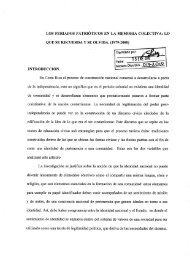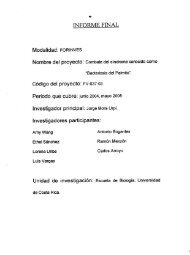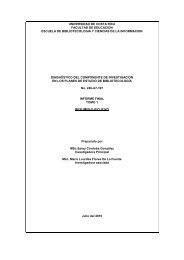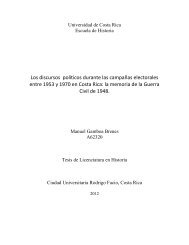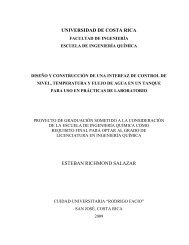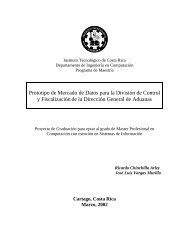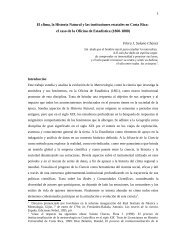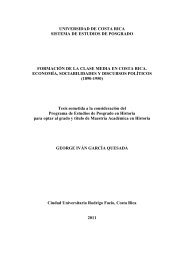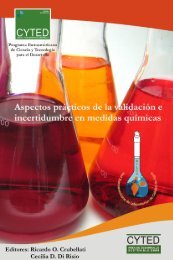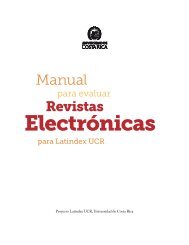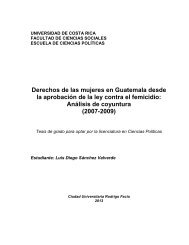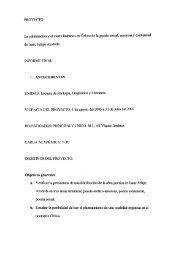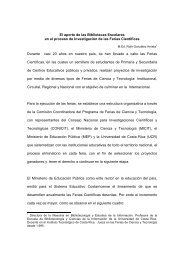A Raisin in the Sun
A Raisin in the Sun
A Raisin in the Sun
Create successful ePaper yourself
Turn your PDF publications into a flip-book with our unique Google optimized e-Paper software.
VCRas<strong>in</strong>__DSC7477, kabelphoto<br />
From Power-over to Power-to:<br />
Power Relations of Women <strong>in</strong><br />
Hansberry's A <strong>Rais<strong>in</strong></strong> <strong>in</strong> <strong>the</strong> <strong>Sun</strong><br />
José Roberto Saravia Vargas<br />
University of Costa Rica, Costa Rica<br />
34
ABSTRACT: Because of b<strong>in</strong>ary oppositions shap<strong>in</strong>g Western thought, power has been traditionally<br />
understood as male dom<strong>in</strong>ation or as an unevenly distributed social resource between genders. However,<br />
an analysis of <strong>the</strong> power relationships of <strong>the</strong> three women <strong>in</strong> Lorra<strong>in</strong>e Hansberry's A <strong>Rais<strong>in</strong></strong> <strong>in</strong> <strong>the</strong> <strong>Sun</strong> <strong>in</strong><br />
<strong>the</strong> light of Derrida's thought shows that <strong>the</strong>se notions do not take <strong>in</strong>to account <strong>the</strong> dynamism and<br />
complexity of power relations and h<strong>in</strong>ts to <strong>the</strong> establishment of a new idea of power: transformative<br />
power.<br />
KEYWORDS: <strong>the</strong>ater, Lorra<strong>in</strong>e Hansberry, Derrida, A <strong>Rais<strong>in</strong></strong> <strong>in</strong> <strong>the</strong> <strong>Sun</strong>, power<br />
RESUMEN: A causa de las oposiciones b<strong>in</strong>arias que estructuran el pensamiento occidental, se ha<br />
entendido el poder tradicionalmente como dom<strong>in</strong>ación mascul<strong>in</strong>a o como un recurso social distribuido<br />
<strong>in</strong>equitativamente entre los géneros. No obstante, un análisis de las relaciones de poder de las tres<br />
mujeres en A <strong>Rais<strong>in</strong></strong> <strong>in</strong> <strong>the</strong> <strong>Sun</strong>, de Lorra<strong>in</strong>e Hansberry, basado en el pensamiento de Derrida, muestra<br />
que dichas nociones no toman en cuenta el d<strong>in</strong>amismo ni la complejidad en las relaciones de poder y<br />
sugiere el establecimiento de una nueva idea de poder: el poder transformativo.<br />
PALABRAS CLAVE: teatro, Lorra<strong>in</strong>e Hansberry, Derrida, A <strong>Rais<strong>in</strong></strong> <strong>in</strong> <strong>the</strong> <strong>Sun</strong>, poder<br />
· · · ·<br />
A <strong>Rais<strong>in</strong></strong> <strong>in</strong> <strong>the</strong> <strong>Sun</strong>, by US playwright Lorra<strong>in</strong>e Hansberry, has been appraised as an important<br />
contribution to fem<strong>in</strong>ism, for it discloses <strong>the</strong> gender roles active at that time. A <strong>Rais<strong>in</strong></strong> <strong>in</strong> <strong>the</strong> <strong>Sun</strong> depicts<br />
<strong>the</strong> struggles of <strong>the</strong> Younger family <strong>in</strong> a poor black neighborhood <strong>in</strong> Chicago and <strong>the</strong> power clashes of<br />
men and women <strong>in</strong> it are evident. For example, Walter Lee, <strong>the</strong> ma<strong>in</strong> character, seeks power through<br />
f<strong>in</strong>ancial success, but he has no money to start his <strong>in</strong>vestment. In order to ga<strong>in</strong> access to <strong>the</strong> money of his<br />
mo<strong>the</strong>r, which he wants to use to start a liquor store, he tries to manipulate Lena, Ruth, and Beneatha, <strong>the</strong><br />
women <strong>in</strong> <strong>the</strong> family, by mak<strong>in</strong>g <strong>the</strong>m feel guilty for not help<strong>in</strong>g him. Lena is <strong>the</strong> mo<strong>the</strong>r of Beneatha and<br />
Walter while Ruth is married to Walter and is thus Beneatha's sister <strong>in</strong> law. The play portrays <strong>the</strong><br />
traditional role of <strong>the</strong> housewife, represented by Ruth, <strong>in</strong> contrast to <strong>the</strong> emerg<strong>in</strong>g role of <strong>the</strong> literate,<br />
educated work<strong>in</strong>g female, which Beneatha embodies. Lena represents <strong>the</strong> old generation of African-<br />
American women com<strong>in</strong>g right from slave sharecroppers. Although from a traditional fem<strong>in</strong>ist perspective<br />
<strong>the</strong> women <strong>in</strong> <strong>the</strong> Younger family might appear to be equally marg<strong>in</strong>al, powerless figures due to<br />
patriarchy, a Derridean analysis shows that Ruth, Beneatha, and Lena <strong>in</strong> fact possess a dynamic,<br />
simultaneous degree of power and powerlessness, which causes uneven and shift<strong>in</strong>g power relations among<br />
<strong>the</strong>m. This also questions <strong>the</strong> traditional idea of power as merely a form of oppression and h<strong>in</strong>ts to <strong>the</strong><br />
establishment of a new concept of power.<br />
Saravia Vargas, José Roberto. "From Power-over to Power-to: Power Relations of Women <strong>in</strong> Hansberry's A <strong>Rais<strong>in</strong></strong> <strong>in</strong> <strong>the</strong> <strong>Sun</strong>"<br />
Impossibilia Nº4, Págs. 34-51 (Octubre 2012) Artículo: Recibido 08/02/2012 - Aceptado 20/03/2012 - Publicado 30/10/2012<br />
35
POWER AND FEMINISM<br />
Fem<strong>in</strong>ism is deeply concerned with power. For a great number of fem<strong>in</strong>ist <strong>the</strong>oreticians, gender<br />
relations hold a deep connection with power structures <strong>in</strong> which, due to patriarchal <strong>in</strong>fluence, men<br />
become <strong>the</strong> ones <strong>in</strong> power while women, as second-class human be<strong>in</strong>gs, are oppressed and marg<strong>in</strong>alized.<br />
This <strong>in</strong>terpretation of power is deeply rooted <strong>in</strong> Simone de Beauvoir's The Second Sex, <strong>in</strong> which she claims<br />
that <strong>the</strong> woman “is def<strong>in</strong>ed and differentiated with reference to man and not he with reference to her; she<br />
is <strong>the</strong> <strong>in</strong>cidental, <strong>the</strong> <strong>in</strong>essential as opposed to <strong>the</strong> essential. He is <strong>the</strong> Subject, he is <strong>the</strong> Absolute –she is<br />
<strong>the</strong> O<strong>the</strong>r” (Beauvoir, 1974: xxii). Similarly, a number of fem<strong>in</strong>ists often refer to Michel Foucault's idea<br />
of structures and hierarchies when def<strong>in</strong><strong>in</strong>g power. He claims: “if we speak of <strong>the</strong> structures or <strong>the</strong><br />
mechanisms of power, it is only <strong>in</strong>sofar as we suppose that certa<strong>in</strong> persons exercise power over o<strong>the</strong>rs”<br />
(Foucault, 1983: 217). From this perspective, fem<strong>in</strong>ists have traditionally perceived power as a structure <strong>in</strong><br />
which some are above and o<strong>the</strong>rs are below. The ones atop execute <strong>the</strong>ir power while <strong>the</strong> ones below are<br />
coerced and yield to <strong>the</strong> <strong>in</strong>fluence of <strong>the</strong> power upon <strong>the</strong>m. This structure possesses a complexity and<br />
dynamism of its own: “<strong>the</strong> multiplicity of force relations immanent <strong>in</strong> <strong>the</strong> sphere <strong>in</strong> which <strong>the</strong>y operate<br />
and which constitute <strong>the</strong>ir own organization; as <strong>the</strong> processes which, through ceaseless struggles and<br />
confrontations, transforms, streng<strong>the</strong>ns, or reverses <strong>the</strong>m; […] thus form<strong>in</strong>g a cha<strong>in</strong> or system” (Foucault,<br />
1979: 92). Follow<strong>in</strong>g Foucault's idea, fem<strong>in</strong>ists believe that this power organization may be transformed<br />
or reversed; hence, one of fem<strong>in</strong>ism's pillars is expos<strong>in</strong>g <strong>the</strong>m <strong>in</strong> all social levels, <strong>in</strong>clud<strong>in</strong>g literary texts.<br />
For most fem<strong>in</strong>ists, power and gender are <strong>in</strong>tr<strong>in</strong>sically tied. If <strong>the</strong>re is a structure of power <strong>in</strong> society<br />
and gender relations are not even, <strong>the</strong>se fem<strong>in</strong>ists conclude that gender difference is <strong>in</strong>deed related to<br />
dom<strong>in</strong>ation. In o<strong>the</strong>r words, one gender assumes <strong>the</strong> center position and <strong>the</strong> o<strong>the</strong>r is forced to assume <strong>the</strong><br />
marg<strong>in</strong>al one. By observ<strong>in</strong>g patriarchy, fem<strong>in</strong>ists conclude that men are <strong>the</strong> ones <strong>in</strong> power while women<br />
are deemed powerless <strong>in</strong> this structure. Accord<strong>in</strong>g to Cathar<strong>in</strong>e MacK<strong>in</strong>non, author of Fem<strong>in</strong>ism<br />
Unmodified: Discourses on Life and Law, “women/men is a dist<strong>in</strong>ction not just of difference, but of power<br />
and powerlessness […]. Power/powerlessness is <strong>the</strong> sex difference” (MacK<strong>in</strong>non, 1987: 123). In this light,<br />
fem<strong>in</strong>ism traditionally believes that society is structured by means of <strong>the</strong> b<strong>in</strong>ary opposition “men<br />
(powerful)/women (powerless),” to which <strong>the</strong>y oppose and thus seek to modify.<br />
Besides <strong>the</strong> idea of power as a mere male dom<strong>in</strong>ation over women, o<strong>the</strong>r fem<strong>in</strong>ist groups view<br />
power differently. Instead of th<strong>in</strong>k<strong>in</strong>g of power as dom<strong>in</strong>ation, <strong>the</strong>se fem<strong>in</strong>ists perceive it as an unevenly<br />
distributed good, perhaps follow<strong>in</strong>g a perspective similar to <strong>the</strong> Marxist notion of unequally distributed<br />
resources <strong>in</strong> society. For <strong>the</strong>m, women are not utterly powerless but <strong>the</strong>y visibly lack this “resource” <strong>in</strong><br />
Saravia Vargas, José Roberto. "From Power-over to Power-to: Power Relations of Women <strong>in</strong> Hansberry's A <strong>Rais<strong>in</strong></strong> <strong>in</strong> <strong>the</strong> <strong>Sun</strong>"<br />
Impossibilia Nº4, Págs. 34-51 (Octubre 2012) Artículo: Recibido 08/02/2012 - Aceptado 20/03/2012 - Publicado 30/10/2012<br />
36
comparison to men. In o<strong>the</strong>r words, power is found more <strong>in</strong> men than it is <strong>in</strong> women, which emphasizes<br />
<strong>the</strong>ir notion of power as a social resource unevenly distributed <strong>in</strong> society. For example, Susan Moller<br />
Ok<strong>in</strong>, <strong>in</strong> her book Justice, Gender and <strong>the</strong> Family, claims that power is unequally distributed between<br />
husbands and wives:<br />
when we look seriously at <strong>the</strong> distribution between husbands and wives of such critical social goods as work (paid<br />
and unpaid), power, prestige, self-esteem, opportunities for self-development, and both physical and economic security,<br />
we f<strong>in</strong>d socially constructed <strong>in</strong>equalities between <strong>the</strong>m, right down <strong>the</strong> list (Ok<strong>in</strong>, 1989: 136).<br />
Aga<strong>in</strong>, this position differs from <strong>the</strong> view of power as male dom<strong>in</strong>ation <strong>in</strong> <strong>the</strong> sense that it ascribes a<br />
degree of power to women while <strong>the</strong> construct of power as male dom<strong>in</strong>ation holds women as powerless<br />
be<strong>in</strong>gs.<br />
Although both <strong>the</strong> position of power as male dom<strong>in</strong>ation and that of power as an unevenly<br />
distributed social good are legitimate <strong>in</strong> general terms, <strong>the</strong>y also imply a simplification of power as an<br />
unvary<strong>in</strong>g, perennial oppressive state only changed through revolution or by a fair redistribution. This<br />
notion is common <strong>in</strong> most fem<strong>in</strong>ist <strong>in</strong>terpretations of literary texts, for fem<strong>in</strong>ist critics tend to emphasize<br />
<strong>the</strong> oppression to which patriarchy subjects women <strong>in</strong> literary works or how patriarchy causes power to be<br />
unequally distributed <strong>in</strong> society and call for a change. However, <strong>the</strong>se common fem<strong>in</strong>ist notions of power<br />
can be fur<strong>the</strong>r analyzed to reveal that <strong>the</strong>se relations of power and gender usually overlook o<strong>the</strong>r aspects of<br />
power structures. For example, <strong>in</strong> fem<strong>in</strong>ist read<strong>in</strong>gs of literary texts, power relations and differences among<br />
women as well as <strong>the</strong> dynamics <strong>in</strong> <strong>the</strong>se structures are seldom disclosed or <strong>the</strong>y are usually written off as<br />
patriarchy by-products. A Derridean perspective of power and its fem<strong>in</strong>ist analysis reveals a subtle, but<br />
important feature of power structures: power itself does not represent a constant, monolithic structure and<br />
traditional views of power need to take such dynamism <strong>in</strong>to consideration.<br />
A DERRIDEAN PERSPECTIVE OF FEMINISM'S VIEWS ON POWER<br />
While at a first glance <strong>the</strong> fem<strong>in</strong>ist positions of power as male dom<strong>in</strong>ation or as an immaterial<br />
resource that is present with less frequency <strong>in</strong> women seem valid and fair, <strong>the</strong>y actually rest upon <strong>the</strong><br />
b<strong>in</strong>ary opposition of presence versus absence that Derrida calls logocentrism and to which he openly<br />
objects:<br />
The system of language associated with phonetic-alphabetic writ<strong>in</strong>g is that with<strong>in</strong> which logocentric metaphysics,<br />
determ<strong>in</strong><strong>in</strong>g <strong>the</strong> sense of be<strong>in</strong>g as presence, has been produced. This logocentrism, this epoch of <strong>the</strong> full speech, has always<br />
Saravia Vargas, José Roberto. "From Power-over to Power-to: Power Relations of Women <strong>in</strong> Hansberry's A <strong>Rais<strong>in</strong></strong> <strong>in</strong> <strong>the</strong> <strong>Sun</strong>"<br />
Impossibilia Nº4, Págs. 34-51 (Octubre 2012) Artículo: Recibido 08/02/2012 - Aceptado 20/03/2012 - Publicado 30/10/2012<br />
37
placed <strong>in</strong> paren<strong>the</strong>sis, suspended, and suppressed for essential reasons, all free reflection on <strong>the</strong> orig<strong>in</strong> and status of<br />
writ<strong>in</strong>g, all science of writ<strong>in</strong>g which was not technology and <strong>the</strong> history of a technique, itself lean<strong>in</strong>g upon a mythology and<br />
a metaphor of a natural writ<strong>in</strong>g. It is this logocentrism which, limit<strong>in</strong>g <strong>the</strong> <strong>in</strong>ternal system of language <strong>in</strong> general by a bad<br />
abstraction, prevents Saussure and <strong>the</strong> majority of his successors from determ<strong>in</strong><strong>in</strong>g fully and explicitly that which is called<br />
“<strong>the</strong> <strong>in</strong>tegral and concrete object of l<strong>in</strong>guistics“ (Derrida, 1978: onl<strong>in</strong>e).<br />
Derrida objects to logocentrism because, <strong>in</strong> his words, it limits an <strong>in</strong>tegral vision of l<strong>in</strong>guistics. His<br />
thought, never<strong>the</strong>less, can also be applied to Western thought <strong>in</strong> general. For Derrida, Western thought is<br />
shaped by a series of b<strong>in</strong>ary operations that highlight one specific mean<strong>in</strong>g construction while obscur<strong>in</strong>g<br />
many o<strong>the</strong>r possible read<strong>in</strong>gs of a text. In order to uncover <strong>the</strong>se o<strong>the</strong>r read<strong>in</strong>gs, Derrida proposes<br />
<strong>in</strong>vert<strong>in</strong>g <strong>the</strong> b<strong>in</strong>ary operations present with<strong>in</strong> texts:<br />
In a traditional philosophical opposition we have not a peaceful coexistence of a vis-à-vis, but ra<strong>the</strong>r with a violent<br />
hierarchy. One of <strong>the</strong> two terms governs <strong>the</strong> o<strong>the</strong>r (axiologically, logically, etc.), or has <strong>the</strong> upper hand. To deconstruct<br />
<strong>the</strong> opposition, first of all, is to overturn <strong>the</strong> hierarchy at a given moment (Derrida, 1981: 41).<br />
In general terms, fem<strong>in</strong>ists have agreed to this idea and have used it to uncover <strong>the</strong> <strong>in</strong>fluence of<br />
patriarchy on society.<br />
Fem<strong>in</strong>ist thought, however, has created a similar b<strong>in</strong>ary opposition of its own. As <strong>the</strong> ones fem<strong>in</strong>ists<br />
oppose to, fem<strong>in</strong>ist constructs and <strong>in</strong>terpretations of society highlight one mean<strong>in</strong>g while obscur<strong>in</strong>g<br />
o<strong>the</strong>rs; such is <strong>the</strong> case of <strong>the</strong> fem<strong>in</strong>ist proposition that society is essentially patriarchal. This belief falls<br />
<strong>in</strong>to what Derrida calls a “transcendental signified”. A transcendental signified is a concept whose mean<strong>in</strong>g<br />
orig<strong>in</strong>ates directly with<strong>in</strong> itself and does not follow a differential or relational association with any o<strong>the</strong>r<br />
realities. As a result, this transcendental signified becomes <strong>the</strong> center of mean<strong>in</strong>g, or “prior truth” which<br />
allows structur<strong>in</strong>g o<strong>the</strong>r ideas of mean<strong>in</strong>g around it (Bressler, 1999: 124). For Derrida, such “prior truths”<br />
are not accurate because <strong>the</strong>y are understood without be<strong>in</strong>g formerly compared to o<strong>the</strong>r signifieds or<br />
signifiers, which for him is impossible as it is perceived when he discusses <strong>the</strong> idea of representation:<br />
The so-called “th<strong>in</strong>g itself” is always already a representamen shielded from <strong>the</strong> simplicity of <strong>in</strong>tuitive evidence.<br />
The representamen functions only by giv<strong>in</strong>g rise to an <strong>in</strong>terpretant that itself becomes a sign and so on to <strong>in</strong>f<strong>in</strong>ity. The<br />
self-identity of <strong>the</strong> signified conceals itself unceas<strong>in</strong>gly and is always on <strong>the</strong> move. The property of <strong>the</strong> representamen is to<br />
be itself and ano<strong>the</strong>r, to be produced as a structure of reference, to be separated from itself. The property of <strong>the</strong><br />
representamen is not to be proper [propre], that is to say absolutely proximate to itself (prope, proprius). The represented is<br />
always already a representamen (Derrida, 1978: onl<strong>in</strong>e).<br />
Specifically, fem<strong>in</strong>ism assumes that patriarchy is a monolithic constant, present <strong>in</strong> all societies, that<br />
Saravia Vargas, José Roberto. "From Power-over to Power-to: Power Relations of Women <strong>in</strong> Hansberry's A <strong>Rais<strong>in</strong></strong> <strong>in</strong> <strong>the</strong> <strong>Sun</strong>"<br />
Impossibilia Nº4, Págs. 34-51 (Octubre 2012) Artículo: Recibido 08/02/2012 - Aceptado 20/03/2012 - Publicado 30/10/2012<br />
38
enjoys a perennial privileged position. In do<strong>in</strong>g so, fem<strong>in</strong>ism claims that women ei<strong>the</strong>r lack power<br />
altoge<strong>the</strong>r or always have it <strong>in</strong> lesser amounts than men do. While at a first glance this assumption appears<br />
fairly accurate, it fails to observe different power structures at play with<strong>in</strong> societies, many of <strong>the</strong>m<br />
overlapp<strong>in</strong>g or even surpass<strong>in</strong>g patriarchal power.<br />
Derrida's th<strong>in</strong>k<strong>in</strong>g, when applied to fem<strong>in</strong>ist views of society, causes one to wonder if societies are<br />
essentially patriarchal and if all <strong>the</strong> power struggles <strong>in</strong> <strong>the</strong>m are issues of men oppress<strong>in</strong>g women and of<br />
women struggl<strong>in</strong>g to acquire a fairer amount of power. Similarly, <strong>the</strong> idea of patriarchy as a constant,<br />
monolithic power structure is questioned. Do members of marg<strong>in</strong>al groups possess power? Are <strong>the</strong>re any<br />
o<strong>the</strong>r forces besides patriarchy at play <strong>in</strong> power struggles related to gender? Is power merely a form of<br />
oppression from men to women? As an example, an analysis of <strong>the</strong> women <strong>in</strong> Lorra<strong>in</strong>e Hansberry's play A<br />
<strong>Rais<strong>in</strong></strong> <strong>in</strong> <strong>the</strong> <strong>Sun</strong> and <strong>the</strong>ir power structures, <strong>in</strong> <strong>the</strong> light of Derrida's thought, provides a useful glimpse of<br />
<strong>the</strong>ir usually undisclosed complexity and dynamism.<br />
THE WOMEN IN A RAISIN IN THE SUN<br />
The three women <strong>in</strong> Hansberry's A <strong>Rais<strong>in</strong></strong> <strong>in</strong> <strong>the</strong> <strong>Sun</strong> are Ruth, Beneatha, and Lena. Their relationship is<br />
summarized <strong>in</strong> <strong>the</strong> figure below:<br />
Ilustración 1: Relationship of <strong>the</strong> Younger Women<br />
Besides k<strong>in</strong>ship, Ruth, Beneatha and Lena share <strong>the</strong>ir humble background, precarious liv<strong>in</strong>g<br />
conditions, and <strong>the</strong>ir belong<strong>in</strong>g to a m<strong>in</strong>ority: <strong>the</strong> three women are African-Americans. Still, <strong>in</strong> terms of<br />
age, each one is separated for at least one decade.<br />
Saravia Vargas, José Roberto. "From Power-over to Power-to: Power Relations of Women <strong>in</strong> Hansberry's A <strong>Rais<strong>in</strong></strong> <strong>in</strong> <strong>the</strong> <strong>Sun</strong>"<br />
Impossibilia Nº4, Págs. 34-51 (Octubre 2012) Artículo: Recibido 08/02/2012 - Aceptado 20/03/2012 - Publicado 30/10/2012<br />
39
Hansberry describes Ruth as follows:<br />
Ruth is about thirty. We can see that she was a pretty girl, even exceptionally so, but now it is apparent that life<br />
has been little that she expected, and disappo<strong>in</strong>tment has already begun to hang <strong>in</strong> her face. In a few years, before thirtyfive<br />
even, she will be known among her people as a “settled woman” (1988: 24).<br />
From this description, it is evident that Ruth has suffered <strong>the</strong> oppressive force of patriarchal<br />
impositions <strong>in</strong> her life. S<strong>in</strong>ce Ruth is married to Walter Lee, Lena's son, she has taken <strong>the</strong> role of a<br />
housewife. She also takes care of Travis, her 10 year old son. To support <strong>the</strong> family, Ruth works <strong>in</strong> <strong>the</strong><br />
kitchen of a different family, which she has done for three years already (Hansberry, 1988: 37).<br />
Hansberry's description of Beneatha contrasts sharply with Ruth's: “She is about twenty, as slim<br />
and <strong>in</strong>tense as her bro<strong>the</strong>r. She is not as pretty as her sister <strong>in</strong> law, but her lean, almost <strong>in</strong>tellectual face has<br />
a handsomeness of its own” (1988: 35). Beneatha is <strong>the</strong> only woman –and member– <strong>in</strong> <strong>the</strong> family with a<br />
higher education level: she is attend<strong>in</strong>g college because her goal is to become a doctor. Beneatha's higher<br />
education level also shows <strong>in</strong> <strong>the</strong> way she talks:<br />
Her speech is a mixture of many th<strong>in</strong>gs; it is different from <strong>the</strong> rest of <strong>the</strong> family's <strong>in</strong>sofar as education has<br />
permeated her sense of English –and perhaps <strong>the</strong> Midwest ra<strong>the</strong>r than <strong>the</strong> South has f<strong>in</strong>ally –at last– won out <strong>in</strong> her<br />
<strong>in</strong>flection; but not altoge<strong>the</strong>r, because over all of it is a soft slurr<strong>in</strong>g and transformed use of vowels which is <strong>the</strong> decided<br />
<strong>in</strong>fluence of <strong>the</strong> Southside (Hansberry, 1988: 35).<br />
Beneatha's different speech sets her apart from <strong>the</strong> o<strong>the</strong>r women, who often have problems to<br />
understand both Beneatha's elaborated words and <strong>in</strong>tellectual concepts, as when Ruth cannot understand<br />
or even pronounce <strong>the</strong> word “assimilationist” that Beneatha has just used (Hansberry 1988: 81).<br />
F<strong>in</strong>ally, Lena, mo<strong>the</strong>r of Beneatha and Ruth's mo<strong>the</strong>r <strong>in</strong> law is an uneducated, conservative woman<br />
of a totally different generation. Hansberry's description of Lena shows her physical and <strong>in</strong>ner strength:<br />
She is a woman <strong>in</strong> her early sixties, full-bodied and strong. She is one of those women of a certa<strong>in</strong> grace and<br />
beauty who wear it so unobtrusively that it takes a while to notice. Her dark-brown face is surrounded by <strong>the</strong> total<br />
whiteness of her hair, and, be<strong>in</strong>g a woman who has adjusted to many th<strong>in</strong>gs <strong>in</strong> life and overcame many more, her face is<br />
full of strength (1988: 39).<br />
Because of <strong>the</strong> generation gap separat<strong>in</strong>g Lena from <strong>the</strong> o<strong>the</strong>r women, she is sometimes unable to<br />
understand <strong>the</strong> way <strong>the</strong> younger women speak:<br />
Saravia Vargas, José Roberto. "From Power-over to Power-to: Power Relations of Women <strong>in</strong> Hansberry's A <strong>Rais<strong>in</strong></strong> <strong>in</strong> <strong>the</strong> <strong>Sun</strong>"<br />
Impossibilia Nº4, Págs. 34-51 (Octubre 2012) Artículo: Recibido 08/02/2012 - Aceptado 20/03/2012 - Publicado 30/10/2012<br />
40
Beneatha: Bro<strong>the</strong>r is a flip –let's face it.<br />
Mama: (To Ruth, helplessly) What's a flip?<br />
Ruth: (Glad to add k<strong>in</strong>dl<strong>in</strong>g) She's say<strong>in</strong>g he's crazy.<br />
Beneatha: Not crazy. Bro<strong>the</strong>r isn't really crazy yet –he –he's an elaborate neurotic (Hansberry, 1988: 49).<br />
Lena is <strong>the</strong> woman who has <strong>the</strong> lowest education level <strong>in</strong> <strong>the</strong> family. Indeed, she is <strong>the</strong> closest to <strong>the</strong><br />
slavery period <strong>in</strong> US history: “Son –I come from five generations of people who was slaves and<br />
sharecroppers” (Hansberry 1988: 143). Still, she is proud of her roots: “a<strong>in</strong>'t nobody <strong>in</strong> my family never<br />
let nobody pay 'em no money that was a way of tell<strong>in</strong>g us we wasn't fit to walk <strong>the</strong> earth. We a<strong>in</strong>'t never<br />
been that poor. [. . .] We a<strong>in</strong>'t never been that –dead <strong>in</strong>side” (Hansberry 1988: 143). Lena's words reveal<br />
her <strong>in</strong>ner strength and pride.<br />
As it can be seen, <strong>the</strong> women <strong>in</strong> <strong>the</strong> Younger family share <strong>the</strong>ir unprivileged social class, belong to a<br />
m<strong>in</strong>ority group (<strong>the</strong>y are African-American), and by def<strong>in</strong>ition are oppressed by patriarchy. Aga<strong>in</strong>, from a<br />
traditional perspective of b<strong>in</strong>ary oppositions, if <strong>the</strong>y are oppressed, <strong>the</strong>y belong to <strong>the</strong> marg<strong>in</strong> and thus are<br />
ei<strong>the</strong>r powerless or share a very limited quota of power. Still, a Derridean analysis of <strong>the</strong>ir relationship<br />
reveals that <strong>the</strong>y possess a power structure which is not equal for each of <strong>the</strong>m and that challenges <strong>the</strong> idea<br />
of gender as <strong>the</strong> factor def<strong>in</strong><strong>in</strong>g power or powerlessness.<br />
POWER STRUCTURES OF THE YOUNGER WOMEN<br />
In terms of power, one could expect Beneatha, <strong>the</strong> educated, liberated woman, to be above <strong>the</strong><br />
o<strong>the</strong>r two women because <strong>the</strong>y are still bl<strong>in</strong>ded by <strong>the</strong> patriarchal system. Lena and Ruth would <strong>the</strong>refore<br />
share <strong>the</strong> same level of power. Ano<strong>the</strong>r position could ma<strong>in</strong>ta<strong>in</strong> that due to age and experience, Lena<br />
would be above <strong>the</strong> two young women, which is true to some extent s<strong>in</strong>ce Lena <strong>in</strong>deed is <strong>the</strong> one <strong>in</strong> charge<br />
of <strong>the</strong> decision mak<strong>in</strong>g <strong>in</strong> <strong>the</strong> Younger family. This would place both Beneatha and Ruth at <strong>the</strong> same level<br />
below Lena. These two possible power structures are summarized <strong>in</strong> <strong>the</strong> figure below:<br />
Saravia Vargas, José Roberto. "From Power-over to Power-to: Power Relations of Women <strong>in</strong> Hansberry's A <strong>Rais<strong>in</strong></strong> <strong>in</strong> <strong>the</strong> <strong>Sun</strong>"<br />
Impossibilia Nº4, Págs. 34-51 (Octubre 2012) Artículo: Recibido 08/02/2012 - Aceptado 20/03/2012 - Publicado 30/10/2012<br />
41
Ilustración 2: Two Possible Power Relationships of <strong>the</strong> Younger Women<br />
One more possible power structure would place Beneatha on top while Lena would follow her <strong>in</strong><br />
<strong>the</strong> hierarchy because of her age and experience and Ruth would be <strong>the</strong> last one. Still, ano<strong>the</strong>r possible<br />
power structure would place Lena on top, followed by Beneatha and with Ruth <strong>in</strong> <strong>the</strong> lowest position.<br />
These traditional power structures based on b<strong>in</strong>ary oppositions are reflected <strong>in</strong> <strong>the</strong> figure below:<br />
Ilustración 3: Two O<strong>the</strong>r Possible Power Relationships of <strong>the</strong> Younger Women<br />
However, <strong>the</strong> power structure <strong>in</strong> <strong>the</strong> Younger women becomes far more complex once that a<br />
Derridean analysis questions <strong>the</strong> simplicity of <strong>the</strong>se traditional views of power and gender.<br />
Saravia Vargas, José Roberto. "From Power-over to Power-to: Power Relations of Women <strong>in</strong> Hansberry's A <strong>Rais<strong>in</strong></strong> <strong>in</strong> <strong>the</strong> <strong>Sun</strong>"<br />
Impossibilia Nº4, Págs. 34-51 (Octubre 2012) Artículo: Recibido 08/02/2012 - Aceptado 20/03/2012 - Publicado 30/10/2012<br />
42
RUTH YOUNGER: THE POWERLESS HOUSEWIFE?<br />
MacK<strong>in</strong>non has called female power “a contradiction <strong>in</strong> terms, socially speak<strong>in</strong>g” (1987: 53). If<br />
her assertion is true, no woman has power of any form. However, her idea comes <strong>in</strong>to question when one<br />
analyzes <strong>the</strong> power relations of Ruth with <strong>the</strong> o<strong>the</strong>r women <strong>in</strong> A <strong>Rais<strong>in</strong></strong> <strong>in</strong> <strong>the</strong> <strong>Sun</strong>. At a first glance, Ruth<br />
appears to be <strong>the</strong> woman with <strong>the</strong> least power –or <strong>the</strong> woman who utterly lacks power <strong>in</strong> any form– if<br />
compared to Beneatha and Lena. While Beneatha is a liberated woman and Lena is <strong>the</strong> head of <strong>the</strong><br />
Younger family, Ruth has totally assimilated <strong>the</strong> discourse of patriarchy. For Ruth, a woman's happ<strong>in</strong>ess<br />
comes from marry<strong>in</strong>g a rich man. This is evident when Beneatha's hesitation about a possible marriage<br />
with George Murchison surprises her: “You mean you wouldn't marry George Murchison if <strong>the</strong> asked you<br />
someday? That pretty, rich th<strong>in</strong>g? Honey, I knew you was odd–” (Hansberry, 1988: 49). Ruth's level of<br />
literacy is basic, which can be expla<strong>in</strong>ed as a product of patriarchal discourse on her: she does not th<strong>in</strong>k it<br />
necessary for a woman to pursue educational goals if all she needs to do is f<strong>in</strong>d<strong>in</strong>g a man who will take care<br />
of her. Ruth appears, thus, a totally helpless victim of patriarchal oppression, especially tak<strong>in</strong>g <strong>in</strong>to account<br />
Patricia Hill's idea of “<strong>in</strong>terlock<strong>in</strong>g systems of oppression”. She expla<strong>in</strong>s this idea as follows:<br />
The notion of <strong>in</strong>terlock<strong>in</strong>g oppressions refers to <strong>the</strong> macro-level connections l<strong>in</strong>k<strong>in</strong>g systems of oppression such as<br />
race, class, and gender. This is <strong>the</strong> model describ<strong>in</strong>g <strong>the</strong> social structures that create social positions. [...] Second, <strong>the</strong><br />
notion of <strong>in</strong>tersectionality describes micro-level processes –namely, how each <strong>in</strong>dividual and group occupies a social<br />
position with<strong>in</strong> <strong>in</strong>terlock<strong>in</strong>g structures of oppression described by <strong>the</strong> metaphor of <strong>in</strong>tersectionality. Toge<strong>the</strong>r <strong>the</strong>y shape<br />
oppression (Hill, 2002: 82).<br />
Due to <strong>the</strong> apparently unprivileged position Ruth has as a result of <strong>the</strong>se <strong>in</strong>terlock<strong>in</strong>g systems of<br />
oppression and <strong>the</strong>ir strong <strong>in</strong>fluence on her, Ruth even lacks <strong>the</strong> vision to realize her victimization. In this<br />
light, one could expect Ruth to feel <strong>in</strong>ferior to Beneatha or to admire her because of <strong>the</strong> latter's high<br />
literacy level. Also, one could expect Ruth to accept Beneatha's authority over her s<strong>in</strong>ce Beneatha is <strong>in</strong><br />
college and is more knowledgeable. Similarly, Ruth might be expected to follow Lena's every word<br />
without question<strong>in</strong>g it, due to Lena's experience <strong>in</strong> life. However, this does not happen because Ruth<br />
actually feels entitled to criticize Beneatha, sees her as <strong>in</strong>ferior, and is even powerful enough to confront<br />
Lena directly.<br />
Although Ruth may be expected to somehow acknowledge Beneatha's power over her, <strong>in</strong> reality she<br />
feels superior to her sister <strong>in</strong> law. Ruth demonstrates her power over Beneatha by us<strong>in</strong>g language as a<br />
dom<strong>in</strong>ation tool: Ruth freely criticizes Beneatha and uses belittl<strong>in</strong>g words when referr<strong>in</strong>g to her sister <strong>in</strong><br />
law. Ruth criticizes Beneatha <strong>in</strong> front of Lena: “You ask me, this child a<strong>in</strong>'t sweet on nobody but herself –<br />
Saravia Vargas, José Roberto. "From Power-over to Power-to: Power Relations of Women <strong>in</strong> Hansberry's A <strong>Rais<strong>in</strong></strong> <strong>in</strong> <strong>the</strong> <strong>Sun</strong>"<br />
Impossibilia Nº4, Págs. 34-51 (Octubre 2012) Artículo: Recibido 08/02/2012 - Aceptado 20/03/2012 - Publicado 30/10/2012<br />
43
(Underbreath) Express herself!” (Hansberry, 1988: 48). Ruth is clearly mock<strong>in</strong>g Beneatha's efforts for selfexpression<br />
as an <strong>in</strong>dividual. For Ruth, Beneatha is simply wast<strong>in</strong>g her time and depicts her as utterly selfcentered.<br />
Clearly, Ruth's discourse may be attributed to patriarchy –Ruth has assimilated patriarchal<br />
premises and has become <strong>the</strong> voice of this oppressive system to keep Beneatha under control s<strong>in</strong>ce <strong>the</strong><br />
young woman represents a threat to Ruth's stability. Still, Ruth would have no reason to feel <strong>in</strong>timidated<br />
by Beneatha because no man is present <strong>in</strong> <strong>the</strong> house at <strong>the</strong> moment and Walter, <strong>the</strong> man <strong>in</strong> <strong>the</strong> family, is<br />
not viewed as a figure of power. In this light, one may trace Ruth's attacks as a way to legitimize her own<br />
power <strong>in</strong> front of Lena, Beneatha's mo<strong>the</strong>r. However, this is not <strong>the</strong> case, for Ruth makes remarks about<br />
Beneatha's behavior even when <strong>the</strong> two women are alone: “Bennie, why you always gotta be pick<strong>in</strong>' on<br />
your bro<strong>the</strong>r? Can't you be a little sweeter sometimes?” (Hansberry, 1988: 38).<br />
Although Ruth is not an educated woman, she does not feel belittled by <strong>the</strong> <strong>in</strong>tellectual level of<br />
Beneatha. In fact, Ruth does not treat her sister <strong>in</strong> law as a woman, for she usually refers to Beneatha as a<br />
“little girl” (Hansberry, 1988: 49). One could ascribe this particular use of language to Ruth's closeness<br />
with Beneatha, but <strong>the</strong> reality is that Beneatha is not a fully grown woman <strong>in</strong> Ruth's eyes: “You th<strong>in</strong>k you<br />
a woman, Bennie –but you still a little girl. What you did was childish– so you got treated like a child”<br />
(Hansberry, 1988: 52).<br />
Ruth's position of power above Beneatha is more evident when one analyzes what happens when<br />
Beneatha tries to <strong>in</strong>quire about Ruth's pregnancy. Ruth disda<strong>in</strong>s Beneatha's <strong>in</strong>sistence and pla<strong>in</strong>ly refuses<br />
to give her any <strong>in</strong>formation: “M<strong>in</strong>d your own bus<strong>in</strong>ess” (Hansberry, 1988: 58). By say<strong>in</strong>g <strong>the</strong>se words,<br />
Ruth reaffirms her position of power over her sister <strong>in</strong> law and excludes her from <strong>the</strong> circle of those with<br />
access to her private <strong>in</strong>formation. Although Ruth's refusal to provide <strong>in</strong>formation to Beneatha may seem a<br />
simple matter of embarrassment, its connection with power is disclosed <strong>in</strong> <strong>the</strong> light of Frye's l<strong>in</strong>k between<br />
power and <strong>in</strong>formation. Frye states that “<strong>the</strong> powerful normally determ<strong>in</strong>e what is said and sayable”<br />
(1983: 105). From this perspective, by deny<strong>in</strong>g <strong>in</strong>formation to Beneatha, Ruth is execut<strong>in</strong>g her power over<br />
her and plac<strong>in</strong>g her sister <strong>in</strong> law <strong>in</strong> <strong>the</strong> marg<strong>in</strong>. This emphasizes <strong>the</strong> idea that Ruth is not below Beneatha<br />
<strong>in</strong> terms of power.<br />
If Ruth is not below Beneatha and appears to be above her, her power relation with Lena becomes<br />
an important issue for analysis as well. Traditional, b<strong>in</strong>ary-opposition based perspectives would conclude<br />
that Ruth necessarily aligns below Lena. S<strong>in</strong>ce Lena is older than Ruth, Ruth's age-related power becomes<br />
<strong>in</strong>effective. Similarly, if age means experience, Lena is much more experienced than Ruth is and makes <strong>the</strong><br />
decisions <strong>in</strong> <strong>the</strong> family. Ruth, however, is empowered enough to defy Lena. This is evident when Ruth<br />
Saravia Vargas, José Roberto. "From Power-over to Power-to: Power Relations of Women <strong>in</strong> Hansberry's A <strong>Rais<strong>in</strong></strong> <strong>in</strong> <strong>the</strong> <strong>Sun</strong>"<br />
Impossibilia Nº4, Págs. 34-51 (Octubre 2012) Artículo: Recibido 08/02/2012 - Aceptado 20/03/2012 - Publicado 30/10/2012<br />
44
does not take Lena's criticism about <strong>the</strong> way Ruth takes care of Travis, Ruth's son:<br />
Mama: [. . .] What you fix for his breakfast this morn<strong>in</strong>g?<br />
Ruth: (Angrily) I feed my son, Lena!<br />
Mama: I a<strong>in</strong>'t meddl<strong>in</strong>g –(Underbreath, busy-bodyish) I just noticed all last week he had cold cereal.<br />
[. . .]<br />
Ruth: (Furious) I gave him hot oats –is that all right! (Hansberry, 1988: 40-41).<br />
Although Lena makes <strong>the</strong> decisions <strong>in</strong> <strong>the</strong> Younger family and Ruth respects her authority, <strong>the</strong> fact<br />
that Ruth confronts Lena's criticism openly reveals a more leveled power relationship between <strong>the</strong> two<br />
women. Ruth is not afraid to defend herself and does not take Lena's criticism sheepishly, which causes<br />
Lena to shift <strong>the</strong> conversation subject and partner. This reveals a shift <strong>in</strong> <strong>the</strong> power structure plac<strong>in</strong>g Ruth<br />
above Lena herself. Ruth is not a powerless housewife, but an empowered woman that is able to confront<br />
even <strong>the</strong> head of <strong>the</strong> family.<br />
Ruth's powerlessness becomes destabilized from a Derridean perspective of her behavior. While<br />
b<strong>in</strong>ary opposites portray Ruth as <strong>the</strong> lowest <strong>in</strong> <strong>the</strong> power hierarchy of <strong>the</strong> Younger women, <strong>the</strong> way Ruth<br />
relates to Beneatha and to Lena challenges this position. Ruth sometimes appears to be <strong>in</strong> <strong>the</strong> same level of<br />
Beneatha and Lena. In o<strong>the</strong>r occasions, Ruth appears to be even above Beneatha or Lena. This highlights<br />
<strong>the</strong> idea that power is not a fixed, hierarchical structure of <strong>the</strong> women <strong>in</strong> A <strong>Rais<strong>in</strong></strong> <strong>in</strong> <strong>the</strong> <strong>Sun</strong>.<br />
BENEATHA YOUNGER: THE EMPOWERED WOMAN?<br />
On a surface level, Beneatha Younger appears to be <strong>the</strong> most liberated and empowered woman <strong>in</strong><br />
A <strong>Rais<strong>in</strong></strong> <strong>in</strong> <strong>the</strong> <strong>Sun</strong>. Aga<strong>in</strong>, this is based on a traditional analysis of b<strong>in</strong>ary opposites re<strong>in</strong>forced by <strong>the</strong><br />
constructs of presence and absence to which Derrida objects. For example, <strong>the</strong> existence –or presence– of<br />
education <strong>in</strong> Beneatha as a person becomes mean<strong>in</strong>gful because education is absent <strong>in</strong> <strong>the</strong> rest of <strong>the</strong><br />
Youngers. Similarly, Beneatha wants to become an <strong>in</strong>dividual of her own while <strong>the</strong> o<strong>the</strong>r women <strong>in</strong> <strong>the</strong><br />
family apparently live accord<strong>in</strong>g to patriarchal premises. This places Beneatha <strong>in</strong> <strong>the</strong> position of an<br />
awakened woman and suggests that she could be above <strong>the</strong> rest of <strong>the</strong> family <strong>in</strong> terms of power: she has a<br />
voice of her own. On a deeper level, however, Beneatha does not seem an empowered woman: she resorts<br />
to oppressive discourse to ga<strong>in</strong> access and becomes <strong>the</strong> powerless one <strong>in</strong> <strong>the</strong> family.<br />
For Marilyn Frye, power and access to resources are deeply <strong>in</strong>tertw<strong>in</strong>ed: “total power is<br />
unconditional access; total powerlessness is be<strong>in</strong>g unconditionally accessible. The creation and<br />
Saravia Vargas, José Roberto. "From Power-over to Power-to: Power Relations of Women <strong>in</strong> Hansberry's A <strong>Rais<strong>in</strong></strong> <strong>in</strong> <strong>the</strong> <strong>Sun</strong>"<br />
Impossibilia Nº4, Págs. 34-51 (Octubre 2012) Artículo: Recibido 08/02/2012 - Aceptado 20/03/2012 - Publicado 30/10/2012<br />
45
manipulation of power is constituted of <strong>the</strong> manipulation and control of access” (1983, 103). In <strong>the</strong> case<br />
of Beneatha, she lacks access to a number of “privileges” <strong>in</strong> <strong>the</strong> Younger family. The most evident is access<br />
to <strong>in</strong>formation. Ruth, for example, refuses to give Beneatha details about her pregnancy because it is not<br />
Beneatha's bus<strong>in</strong>ess, but <strong>the</strong> young woman defends her right to know (Hansberry, 1988: 58). Even though<br />
Beneatha is apparently empowered by possess<strong>in</strong>g knowledge, <strong>in</strong> reality she lacks a voice of her own <strong>in</strong> <strong>the</strong><br />
family, which she perceives and deeply resents: “Why, why can't I say what I want to around here, like<br />
everybody else?” (Hansberry 1988: 51).<br />
S<strong>in</strong>ce Beneatha lacks access and her own voice <strong>in</strong> <strong>the</strong> family, she turns to oppressive discourse to<br />
make up for this lack. She struggles for power by us<strong>in</strong>g language as a tool to emphasize her superiority and<br />
thus to become empowered. This struggle for power through language becomes evident when she belittles<br />
Ruth: “You wouldn't even beg<strong>in</strong> to understand. Anybody who married Walter could not possibly<br />
understand” (Hansberry, 1988: 49). The words Beneatha uses to underm<strong>in</strong>e Ruth reveal her clear <strong>in</strong>tent<br />
of plac<strong>in</strong>g herself <strong>in</strong> a superior <strong>in</strong>tellectual level, which resembles more <strong>the</strong> discourse of patriarchy to<br />
legitimize power than that of a liberated, empowered woman. Beneatha applies this oppressive discourse<br />
on Lena as well:<br />
Beneatha: I don't flit! I –I experiment with different forms of expression.<br />
[. . .]<br />
Beneatha: –People have to express <strong>the</strong>mselves one way or ano<strong>the</strong>r.<br />
Mama: What is it you want to express?<br />
Beneatha: (Angrily) Me! [. . .] Don't worry –I don't expect you to understand (Hansberry, 1988: 48).<br />
Aga<strong>in</strong>, if Beneatha is <strong>in</strong>deed a liberated woman, why does she underm<strong>in</strong>e o<strong>the</strong>r women? Her<br />
struggle for power by means of language becomes a possible explanation.<br />
Beneatha's need to ga<strong>in</strong> access –and power– is more evident when she defies Lena's religious<br />
authority:<br />
Mama: (K<strong>in</strong>dly) 'Course you go<strong>in</strong>g to be a doctor, honey, God will<strong>in</strong>g.<br />
Beneatha: (Drily) God hasn't got a th<strong>in</strong>g to do with it.<br />
Mama: Beneatha –that just wasn't necessary.<br />
Beneatha: Well –nei<strong>the</strong>r is God. I get sick of hear<strong>in</strong>g about God.<br />
Mama: Beneatha! (Hansberry, 1988: 50).<br />
Saravia Vargas, José Roberto. "From Power-over to Power-to: Power Relations of Women <strong>in</strong> Hansberry's A <strong>Rais<strong>in</strong></strong> <strong>in</strong> <strong>the</strong> <strong>Sun</strong>"<br />
Impossibilia Nº4, Págs. 34-51 (Octubre 2012) Artículo: Recibido 08/02/2012 - Aceptado 20/03/2012 - Publicado 30/10/2012<br />
46
Beneatha's remark about God is, as Lena po<strong>in</strong>ts it out, unnecessary at that po<strong>in</strong>t. However,<br />
Beneatha keeps push<strong>in</strong>g her lack of religious faith on Lena until <strong>the</strong> latter cannot stand it any longer. This<br />
is clearly an act of subversion on Beneatha's part, for <strong>the</strong> young woman even calls her mo<strong>the</strong>r a tyrant: “I<br />
see (quietly). I also see that everybody th<strong>in</strong>ks it's all right for Mama to be a tyrant. But all <strong>the</strong> tyranny <strong>in</strong><br />
<strong>the</strong> world will never put a God <strong>in</strong> <strong>the</strong> heavens!” (Hansberry, 1988: 52). Aga<strong>in</strong>, subversion would be<br />
irrelevant for Beneatha if she possessed power, but her rebellion aga<strong>in</strong>st her mo<strong>the</strong>r's faith shows that <strong>the</strong><br />
young woman lacks agency and thus, power. This questions <strong>the</strong> idea rooted <strong>in</strong> b<strong>in</strong>ary oppositions of<br />
presence and absence that Beneatha is situated <strong>in</strong> a higher power hierarchy than <strong>the</strong> o<strong>the</strong>r women.<br />
LENA YOUNGER: THE STRONG HEAD OF THE FAMILY?<br />
For Carole Pateman, women are below men <strong>in</strong> terms of power and this hierarchy becomes <strong>the</strong><br />
standard <strong>in</strong> today's society: “<strong>in</strong> modern civil society all men are deemed good enough to be women's<br />
masters” (1988: 219). This is not, however, <strong>the</strong> case for Lena Younger. Lena is <strong>the</strong> maximum authority <strong>in</strong><br />
<strong>the</strong> Younger family and no o<strong>the</strong>r member –male or female– questions her power. Even Walter Lee, <strong>the</strong><br />
man <strong>in</strong> <strong>the</strong> family, acknowledges her unquestionable authority: “What you need me to say you done right<br />
for? You <strong>the</strong> head of this family. You run our lives like you want to” (Hansberry, 1988: 94-95).<br />
Although immersed <strong>in</strong> a patriarchal model and not even know<strong>in</strong>g about it, Lena has achieved power<br />
<strong>in</strong> <strong>the</strong> family because of <strong>the</strong> historical development of her ethnic group. Lena is an African-American, and<br />
this group's struggle for freedom from racial oppression has overlapped with that of freedom from gender<br />
oppression:<br />
It does not matter that sexism assigned <strong>the</strong>m this role [homemak<strong>in</strong>g]. It is more important that <strong>the</strong>y took this<br />
conventional role and expanded it to <strong>in</strong>clude car<strong>in</strong>g for one ano<strong>the</strong>r, for children, for black men, <strong>in</strong> ways that elevated our<br />
spirits, that kept us from despair, that taught some of us to be revolutionaries able to struggle for freedom (Hooks, 1990:<br />
44).<br />
In this light, <strong>the</strong> traditional role of homemak<strong>in</strong>g that patriarchy used to enslave white women<br />
became a source of power for black women. Hooks puts it this way: “Historically, black women have<br />
resisted white supremacy dom<strong>in</strong>ation by work<strong>in</strong>g to establish homeplace” (Hooks, 1990: 44). From this<br />
perspective, more than a helplessly enslaved woman, Lena becomes an active promoter of resistance to<br />
racial oppression <strong>in</strong> her family. This is evident when Lena confronts her son Walter and asks him to decide<br />
what to teach to his son:<br />
Saravia Vargas, José Roberto. "From Power-over to Power-to: Power Relations of Women <strong>in</strong> Hansberry's A <strong>Rais<strong>in</strong></strong> <strong>in</strong> <strong>the</strong> <strong>Sun</strong>"<br />
Impossibilia Nº4, Págs. 34-51 (Octubre 2012) Artículo: Recibido 08/02/2012 - Aceptado 20/03/2012 - Publicado 30/10/2012<br />
47
Mama: (open<strong>in</strong>g her eyes and look<strong>in</strong>g <strong>in</strong>to Walter's) No. Travis, you stay right here. And you make him understand<br />
what you do<strong>in</strong>g, Walter Lee. You teach him good. Like Willy Harris taught you. You show where our five generations<br />
done come to. (Walter looks from her to <strong>the</strong> boy, who gr<strong>in</strong>s at him <strong>in</strong>nocently) Go ahead, son –(she folds her hands and closes<br />
her eyes) Go ahead (Hansberry, 1988: 147).<br />
Far from just be<strong>in</strong>g subjected to patriarchy, Lena actually becomes an agent and a force liberat<strong>in</strong>g<br />
her family from racial oppression. However, Lena also becomes an oppressor herself, for she exerts her<br />
power fiercely upon Beneatha:<br />
Mama: Now –You say after me, <strong>in</strong> my mo<strong>the</strong>r's house <strong>the</strong>re is still God. (There is a long pause and Beneatha stares at <strong>the</strong><br />
floor wordlessly. Mama repeats <strong>the</strong> phrase with precision and cool emotion) In my mo<strong>the</strong>r's house <strong>the</strong>re is still God.<br />
Beneatha: In my mo<strong>the</strong>r's house <strong>the</strong>re is still God.<br />
(A long pause.)<br />
Mama: (Walk<strong>in</strong>g away from Beneatha, too disturbed for triumphant posture. Stopp<strong>in</strong>g and turn<strong>in</strong>g back to her daughter)<br />
There are some ideas we a<strong>in</strong>'t go<strong>in</strong>g to have <strong>in</strong> this house. Not long as I am <strong>the</strong> head of this family (Hansberry, 1988: 51).<br />
S<strong>in</strong>ce Lena even resorts to physical violence to keep her power over her children (she slaps Beneatha<br />
and beats up Walter), she could be thought of as a hegemonic and also strongest power figure <strong>in</strong> <strong>the</strong><br />
family, but this is not <strong>the</strong> case, for Lena <strong>in</strong>deed feels <strong>in</strong> a lower position than that of her children: “They<br />
frightens me, Ruth. My children. [. . .] And <strong>the</strong> o<strong>the</strong>r [Beneatha] done commence to talk about th<strong>in</strong>gs I<br />
can't seem to understand <strong>in</strong> no form or fashion” (Hansberry, 1988: 52). Her fears and <strong>in</strong>security, far from<br />
plac<strong>in</strong>g her a strong leader <strong>in</strong> <strong>the</strong> family, highlight her vulnerability and lack of strength. From this<br />
perspective, Lena's powerful position and unquestionable authority become destabilized, which suggests<br />
that <strong>the</strong> traditional notion of power as dom<strong>in</strong>ation of someone else is nei<strong>the</strong>r constant nor monolithic.<br />
TRANSFORMATIVE POWER: A REDEFINITION OF POWER<br />
Traditional def<strong>in</strong>itions of power based on notions of b<strong>in</strong>ary opposites fail to fully assess <strong>the</strong><br />
dynamism and complexity of power because <strong>the</strong>y reduce power relations to oversimplified constructs. An<br />
analysis of such relations among <strong>the</strong> women of Hansberry's A <strong>Rais<strong>in</strong></strong> <strong>in</strong> <strong>the</strong> <strong>Sun</strong> exemplifies <strong>the</strong> <strong>in</strong>accuracy<br />
of traditionally understood power hierarchies, for it discloses easily overlooked power shifts and overlaps,<br />
and reveals <strong>the</strong> simultaneous presence and absence of power <strong>in</strong> <strong>the</strong> female characters <strong>in</strong> <strong>the</strong>ir power<br />
relations. In this light, a new def<strong>in</strong>ition of power becomes necessary, which echoes <strong>the</strong> claims of some<br />
fem<strong>in</strong>ist groups who state that current def<strong>in</strong>itions of power are to be revised. For example, Sarah Lucia<br />
Hoagland def<strong>in</strong>es power as “<strong>the</strong> power of ability, of choice and engagement. It is creative; and hence it is<br />
an affect<strong>in</strong>g and transform<strong>in</strong>g power but not a controll<strong>in</strong>g power” (1988:118). This k<strong>in</strong>d of power is<br />
Saravia Vargas, José Roberto. "From Power-over to Power-to: Power Relations of Women <strong>in</strong> Hansberry's A <strong>Rais<strong>in</strong></strong> <strong>in</strong> <strong>the</strong> <strong>Sun</strong>"<br />
Impossibilia Nº4, Págs. 34-51 (Octubre 2012) Artículo: Recibido 08/02/2012 - Aceptado 20/03/2012 - Publicado 30/10/2012<br />
48
perceived <strong>in</strong> Lena when Beneatha tells her why she does not like George Murchison, <strong>the</strong> rich boy:<br />
Beneatha: Mama, George is a fool –honest. (She rises)<br />
[…]<br />
Mama: You sure?<br />
Beneatha: Yes.<br />
Mama: Well –I guess you better not waste your time with no fools (Hansberry, 1988: 98).<br />
Lena possesses <strong>the</strong> power to engage with her daughter's feel<strong>in</strong>gs and, <strong>in</strong>stead of impos<strong>in</strong>g on<br />
Beneatha a patriarchal vision of comfort and happ<strong>in</strong>ess, Lena empowers Beneatha with <strong>the</strong> freedom to<br />
choose for herself. Beneatha shows a similar k<strong>in</strong>d of power afterwards. Even though she has called her<br />
mo<strong>the</strong>r a tyrant, Beneatha possesses <strong>the</strong> power to grow and to thank her mo<strong>the</strong>r for her understand<strong>in</strong>g:<br />
Beneatha: Mama–<br />
Mama: Yes, baby–<br />
Beneatha: Thank you.<br />
Mama: For what?<br />
Beneatha: For understand<strong>in</strong>g me this time. (Hansberry, 1988: 98).<br />
Beneatha's power is what Starhawk def<strong>in</strong>es as “<strong>the</strong> power that emerges from with<strong>in</strong>, that is <strong>in</strong>herent<br />
<strong>in</strong> us as <strong>the</strong> power to grow is <strong>in</strong>herent <strong>in</strong> <strong>the</strong> seed” (1987: 8). Ruth also displays a similar k<strong>in</strong>d of power<br />
when Lena's resolution falters: “You just got strong-willed children and it takes a strong woman like you<br />
to keep 'em <strong>in</strong> hand” (Hansberry, 1988: 52). Ruth's words are especially important, for <strong>the</strong>y show her<br />
understand<strong>in</strong>g of Lena's transformative power. For Ruth, Lena is not a tyrant but a woman who possesses<br />
a power to transform her children <strong>in</strong> Hoagland's sense.<br />
In conclusion, <strong>the</strong> women <strong>in</strong> Hansberry's A <strong>Rais<strong>in</strong></strong> <strong>in</strong> <strong>the</strong> <strong>Sun</strong> exemplify how traditional, presenceabsence<br />
constructs reduce <strong>the</strong> dynamic and shift<strong>in</strong>g nature of power relations to simple monolithic<br />
hierarchies that cannot fully expla<strong>in</strong> <strong>the</strong> <strong>in</strong>tricacies of power <strong>in</strong> society. Similarly, this suggests <strong>the</strong> necessity<br />
of redef<strong>in</strong><strong>in</strong>g power <strong>in</strong> a more open manner. The idea of power as an <strong>in</strong>ner ability for transformation<br />
becomes a step <strong>in</strong> this direction.<br />
Saravia Vargas, José Roberto. "From Power-over to Power-to: Power Relations of Women <strong>in</strong> Hansberry's A <strong>Rais<strong>in</strong></strong> <strong>in</strong> <strong>the</strong> <strong>Sun</strong>"<br />
Impossibilia Nº4, Págs. 34-51 (Octubre 2012) Artículo: Recibido 08/02/2012 - Aceptado 20/03/2012 - Publicado 30/10/2012<br />
49
BIBLIOGRAPHY<br />
Beauvoir, S. de (1974). The Second Sex. New York: V<strong>in</strong>tage Books.<br />
Bressler, Ch. E. (1999). Literary Criticism. New Jersey: Prentice-Hall.<br />
Derrida, J. (1978). Of Grammatology. Baltimore: John Hopk<strong>in</strong>s University Press. February 3, 2012.<br />
<br />
― (1981). Positions (Trans. Alan Bass). Chicago: University of Chicago Press.<br />
Foucault, M. (1979). The History of Sexuality, Volume 1: An Introduction (Trans. Robert<br />
Hurley). New York: V<strong>in</strong>tage.<br />
― (1983). Afterword: The Subject and Power. In H. Dreyfus & P. Rav<strong>in</strong>ow. Michel Foucault: Beyond<br />
Structuralism and Hermeneutics (pp. 229-264). Chicago: University of<br />
Chicago Press.<br />
Frye, M. (1983). The Politics of Reality: Essays <strong>in</strong> Fem<strong>in</strong>ist Theory. Freedom, California:<br />
The Cross<strong>in</strong>g Press.<br />
Hansberry L. (1988). A <strong>Rais<strong>in</strong></strong> <strong>in</strong> <strong>the</strong> <strong>Sun</strong>. New York: Signet.<br />
Hill Coll<strong>in</strong>s, P., et al. (2002). Symposium on West and Fenstermaker's "Do<strong>in</strong>g Difference". Do<strong>in</strong>g<br />
Gender, Do<strong>in</strong>g Difference (pp. 81-84). In S. Fenstermaker & C. West (Eds.). New York: Routledge.<br />
Hoagland, S. L. (1988). Lesbian Ethics: Toward a New Value. Palo Alto: Institute of Lesbian Studies.<br />
Hooks, B. (1990). Yearn<strong>in</strong>g; race, gender, and cultural politics. Boston: South end Press.<br />
MacK<strong>in</strong>non, C. (1987). Fem<strong>in</strong>ism Unmodified: Discourses on Life and Law. Cambridge, MA: Harvard<br />
University Press.<br />
Ok<strong>in</strong>, S. M. (1989). Justice, Gender and <strong>the</strong> Family. New York: Basic Books.<br />
Saravia Vargas, José Roberto. "From Power-over to Power-to: Power Relations of Women <strong>in</strong> Hansberry's A <strong>Rais<strong>in</strong></strong> <strong>in</strong> <strong>the</strong> <strong>Sun</strong>"<br />
Impossibilia Nº4, Págs. 34-51 (Octubre 2012) Artículo: Recibido 08/02/2012 - Aceptado 20/03/2012 - Publicado 30/10/2012<br />
50
Pateman, C. (1988). The Sexual Contract. Stanford: Stanford University Press.<br />
Starhawk (1987). Truth or Dare: Encounters with Power, Authority, and Mystery. San Francisco: Harper.<br />
Saravia Vargas, José Roberto. "From Power-over to Power-to: Power Relations of Women <strong>in</strong> Hansberry's A <strong>Rais<strong>in</strong></strong> <strong>in</strong> <strong>the</strong> <strong>Sun</strong>"<br />
Impossibilia Nº4, Págs. 34-51 (Octubre 2012) Artículo: Recibido 08/02/2012 - Aceptado 20/03/2012 - Publicado 30/10/2012<br />
51



